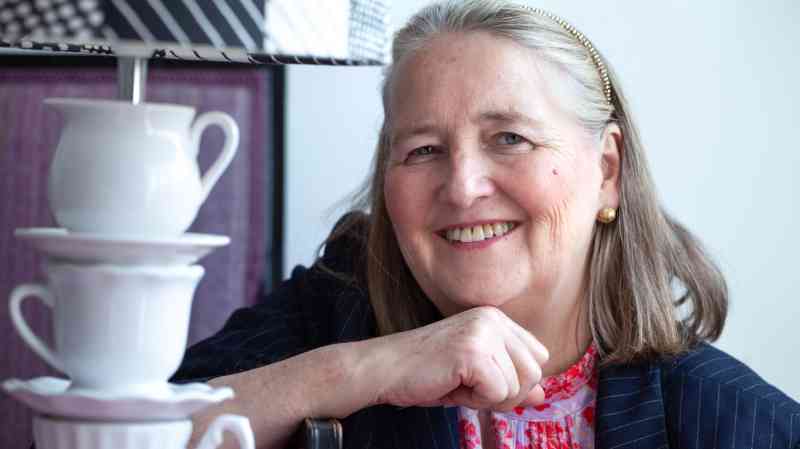Millennium celebrations helped me get the party started
A passion for throwing elaborate dinner parties may have sparked Clare Harris’s decision to start the decorations business Talking Tables 25 years ago but it was her decision to supply retailers rather than directly to consumers that has led to its longevity.
Harris leaned on sales training from a previous job at IBM, the American technology group, to approach buyers from Sainsbury’s and John Lewis just before the millennium to pitch her pretty disposable plates and table games. She also took a small stand at Top Drawer, the UK trade show held annually at London’s Olympia.
Buyers were won over by her focus on aesthetics rather than price, said Harris, who used to give her dinner parties a theme that would then dictate the decorations and entertainment for the evening. One example was when she held an evening for friends who had just come back from a trip around the world. The table was decorated with world maps and each guest had 100 pieces of a jigsaw wrapped in a napkin that they then completed together.
“I was able to put a collection together that the retailers could say was for the biggest party the world was ever going to have — the millennium. So the gap was there and the opportunity was there because retailers wanted to get behind the millennium,” Harris, 63, said.
After the celebrations to see in the year 2000, she built on the momentum to sell in a range for Christmas 2001. And so it continued. Talking Tables, which is owned outright by Harris and her partner, Mark McCormack, had sales of £24.8 million and pre-tax profits of £2.4 million in the year to February 2023. Its key retail partners are John Lewis, Tesco, Sainsbury’s, Marks & Spencer and Amazon.

But not all party supplies businesses are in such rude health, especially those selling directly to consumers who are now in direct competition with Amazon. The most high-profile casualty was Party Pieces, owned by Carole and Michael Middleton, the parents of the Princess of Wales, which fell into administration last year owing creditors £2.6 million. It was thought that the business suffered a drop in sales during the pandemic.
“We deal with a lot of online party people and they’re all shrinking. So it wasn’t just [Party Pieces],” Harris said.
Where Covid may have been the final nail in the coffin for Party Pieces, it didn’t slow Talking Tables’ growth. Harris puts this down to the fact that all its big retail partners — supermarkets and online retailers — remained open during the pandemic, as well as people making more effort when hosting smaller gatherings in homes and gardens.
“With people not going into offices, they had more time to focus on their little son or daughter’s birthday. They might have been able to make a cake and would get some balloons and other decorations in the screen as they Zoom [called] a sister in New York or Australia,” Harris said.
The same was true as rules were eased and groups of six were allowed to get together. “It suited us because it is what we stood for — little gatherings in the garden or little gatherings in your home. Whereas once you could go to restaurants, you don’t need our napkins, or our lanterns and bunting.”
Where Covid has been a challenge is the impact it has had on ways of working. Harris is a proponent of office-based working, but says it has been difficult to attract more senior staff in particular, who frequently request to work from home. The policy at Talking Tables, which is based in Stockwell, southwest London, is to allow employees one day at home, but to be office-based the rest of the time.
“My stance is that we are a company that brings people together, and as a society we need to be careful what we wish for. My son is 22 — I don’t wish for him to be working in a bedroom. I made some of my greatest friends at work where we were colleagues. I think it would be lonely working from home,” Harris said.
She says there are also practical reasons for in-person working. “We deal in product, and if everyone is working from home the product will come out the wrong colour, the wrong size, and it just works slower,” Harris said. She adds that the tide is turning — when hiring for a senior position recently she noticed that “there’s quite a few people who have worked from home for four years and now want to get back into the office”.
Harris says that a succession plan has yet to be worked out for Talking Tables but that she has no plans to retire just yet. “I think the minute you start thinking like that your motivation may slow down. And I still enjoy [the job]. There’s an intellectual challenge to it,” Harris said.
She says while her job title has remained the same, the job itself is constantly changing. “The competition’s not the same, the channels aren’t the same. Recruitment’s different. Everything changes. So it is the same company but, equally, every week it’s a different company.”
Harris is steeling herself for the next phase of growth, which will involve hiring external talent into senior roles. “I think one of the challenges is bringing in and absorbing senior management from outside and we will have to do that. But it’s not easy to absorb people at a senior level, compared to homegrown people who know everything from memory and you all know how to work together. So I know the next stage of growth will be challenging.”
As for her dinner parties, she’s already handed the baton to younger team members when it comes to “tablescaping”, or laying the table for celebratory dinners.
“We did a meal at our house in London with everyone who’s worked [for us] for over five years. But two of the marketing team kindly did the table — they did it much nicer than I would do it these days.”






